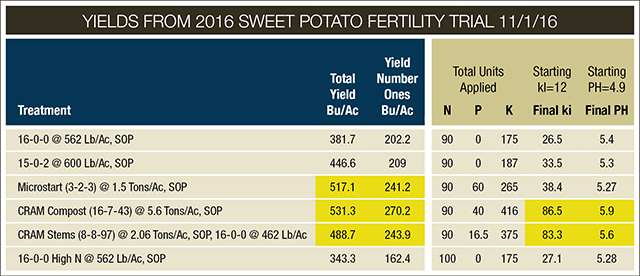Research Information
Our compost has five times the levels of potassium typically found in other compost produced in the state. Potassium (or pot ash) helps plants develop strong root systems and fight off disease, and also helps with the absorption of other nutrients.
Our compost has been used on test plots containing row crops; pasture (fescue and Coastal Bermuda grass); turf (both turf production sites and athletic fields); highway beautification areas; forest products; and bio-energy crops (sorghum, switchgrass, and rape seed). Crop responses have been outstanding on all sites, matching or exceeding yields obtained using commercial fertilizer.
All results are measured and continue to meet state requirements. Data is continually being collected and evaluated through test trials to provide valuable information about the compost product to growers.

*Lime 1 Ton/Ac was applied at planting
* KI = Potassium Index from NCDA
Sweet Potato Variety: Covington
Trial conducted in Whitakers, NC by Carolina Precision Consulting, Inc.
CRAM Compost Nutrient Levels Range
| Nitrogen: | 1.5% to 3% (assume 50% PAN or 0.5% of N is plant available); 20 to 40 pounds per ton |
| Phosphorous: | 0.2% to 0.4%; 5 to 10 pounds per ton |
| Potassium | 2% to 4%; 40 to 80 pounds per ton |
